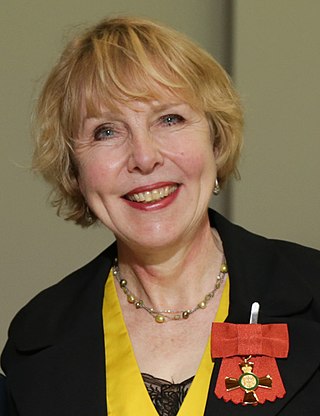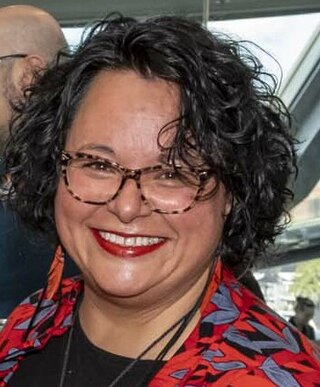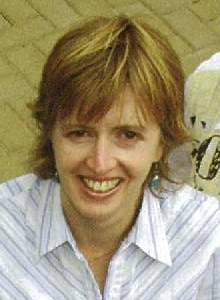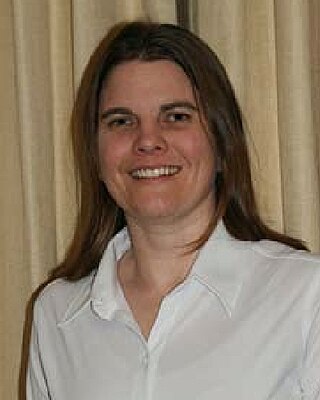
Linda Tuhiwai Te Rina Smith, previously a professor of indigenous education at the University of Waikato in Hamilton, New Zealand, is now Distinguished Professor at Te Whare Wānanga o Awanuiārangi. Smith's academic contribution is about decolonising knowledge and systems. The Royal Society Te Apārangi describes Smith’s influence on education as creating "intellectual spaces for students and researchers to embrace their identities and transcend dominant narratives".
Marti J. Anderson is an ecological statistician whose works is interdisciplinary, from marine biology and ecology to mathematical and applied statistics. Her core areas of research and expertise are: community ecology, biodiversity, multivariate analysis, resampling methods, experimental designs, and statistical models of species abundances. Based in Auckland, New Zealand, she is a Distinguished Professor in the New Zealand Institute for Advanced Study at Massey University and also the Director of the New Zealand research and software-development company, PRIMER-e.
Claire M. Breen is a New Zealand law academic, and as of 2021 is a full professor at the University of Waikato. Her work focuses on children's legal rights, international human rights and international peace and security.

Priscilla M. Wehi is a New Zealand ethnobiologist and conservation biologist. As at July 2021 she is an associate professor at the University of Otago and on the first of that month officially undertook the role of director of Te Pūnaha Matatini, a centre of research excellence in complex systems and data analytics. During the COVID-19 pandemic in New Zealand Te Pūnaha Matatini scientists have developed mathematical models of the spread of the virus across the country that influence the New Zealand government's response to the outbreak. In 2021 Wehi was awarded the Hill Tinsley Medal.

Dianne Sika-Paotonu is a New Zealand immunologist, biomedical scientist and academic in the Department of Pathology and Molecular Medicine and Associate Dean (Pacific) at the University of Otago Wellington. She is of Tongan descent and is the first Pasifika biomedical scientist to receive the Cranwell Medal for science communication in 2020 and the 2022 Prime Minister's Science Communicator of the Year prize.
Rosemary Yolande Levinge Seymour was a New Zealand feminist academic. She was instrumental in establishing New Zealand's first women's studies course at the University of Waikato in 1974, the Women's Studies Journal, and the Women's Studies Association of New Zealand.
William Leslie Renwick was a New Zealand educationalist. He was educated in Northland and Auckland before training as a teacher at Auckland Teachers' Training College. After working as a teacher and gaining a BA from Victoria University of Wellington, he was appointed as a researcher to the Commission on Education. After a number of school inspector positions within the Department of Education, he was appointed Director-General of Education in 1975. Retiring from the department in 1988, he took up a research position at the Stout Research Centre in Wellington. He performed background research on Treaty of Waitangi claims, and wrote an extensive review for the University of Waikato on their handling of complaints against a doctoral student. He had a variety of committee and board roles in New Zealand and overseas, including as a council member of the University of the South Pacific, a member of the OECD Education Committee, chair of the New Zealand National Commission for UNESCO, a member of the governance board for the Commonwealth of Learning, and as a member of the QEII Arts Council and the advisory committee of the historical branch of the Department of Internal Affairs.

Hendrika Martine Crezee, known as Ineke Crezee, is a New Zealand linguist. She is a full professor at the Auckland University of Technology, specialising in healthcare interpreting and in the education of interpreters and translators.

Jodie Margaret Roberta Hunter is a New Zealand academic, of Cook Island Māori descent, and is a full professor at Massey University. Hunter researches mathematics pedagogy, with a particular interest in culturally responsive teaching of mathematics to Pasifika students. She is a Rutherford Discovery Fellow and has been a Fulbright Scholar.
Heidi Stöckl is a German researcher and sociologist at the Ludwig Maximilian University of Munich. Her research investigates gender-based violence and human trafficking. She has previously worked at the London School of Hygiene and Tropical Medicine and with the World Health Organization on the design and implementation of strategies to end violence against women.

Terryann Coralie Clark, known as TC, is a New Zealand Māori nursing academic, and as of 2023 is a full professor at the University of Auckland, specialising in Māori health, adolescent wellbeing and mental and sexual health.

Melinda Webber is a New Zealand academic, and is a full professor at the University of Auckland, specialising in Māori identity and ways in which race, ethnicity, identity and culture impact on young people and their success. She is of Ngāti Hau, Ngāti Kahu, Ngāpuhi and Ngāti Whakaue descent.
Katherine Ravenswood is a New Zealand professor of industrial relations and leads the Care/Work Research Group at Auckland University of Technology (AUT). She works on the interactions of power, gender and ethnicity in workplace relationships between employers and employees.
Merilyn Manley-Harris is a New Zealand chemist, and is a professor emeritus at the University of Waikato, specialising in carbohydrate chemistry, particularly relating to mānuka honey.
Verica Rupar is a Serbian–New Zealand journalist and academic, and is professor of journalism at Auckland University of Technology (AUT). She researches comparative and historical epistemology of journalism.

Juliana Mansvelt is a New Zealand social geographer and is a full professor at Massey University, specialising in the geographies of ageing and consumption.

Nitha Palakshappa, also known as Nitha Dolli, is a New Zealand marketing academic, and is a full professor at Massey University, specialising in sustainability and marketing in the fashion and food sectors.
Keren Elizabeth Dittmer is a New Zealand academic, and is professor of veterinary pathology at Massey University, specialising in animal skeletal pathology, vitamin D, and genetic diseases.

Kathryn Louise Beck is a New Zealand academic, a registered dietitian, and is a full professor at Massey University, specialising in dietary assessment, sustainable nutrition, and iron deficiency in young women and sportspeople.
Sandra Lee Morrison is a New Zealand academic, and is a full professor at the University of Waikato, specialising in researching and advocating for adult education for diverse populations across the Asia Pacific region.









